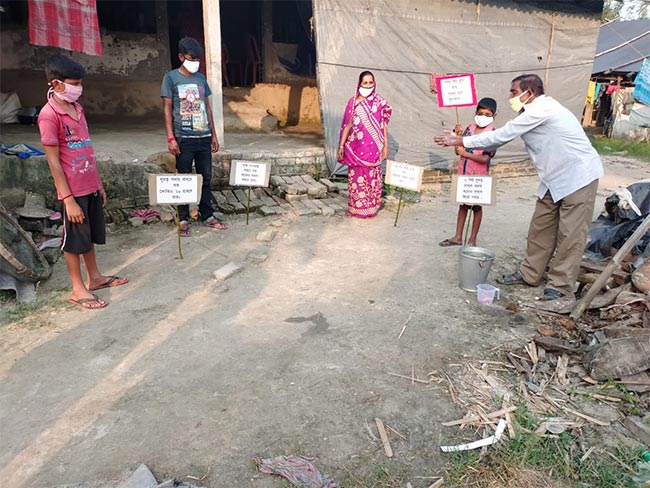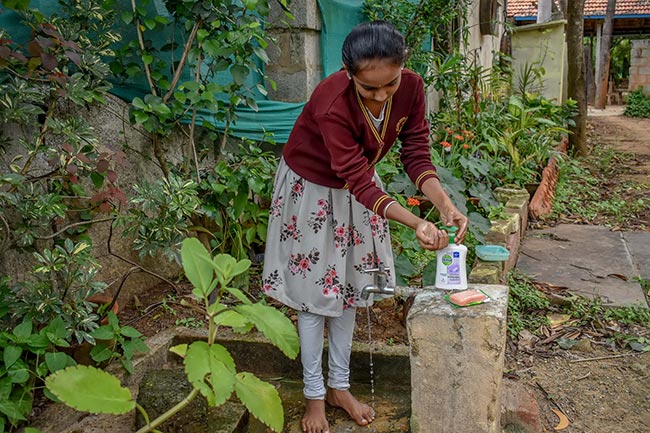Highlights
- Global Handwashing Day is dedicated to increasing awareness on handwashing
- NGO Smile Foundation is promoting hygiene among students and their families
- The team educates through interactive videos, tele counselling, and skits
New Delhi: “To kill germs and fight Coronavirus, we should wash our hands with soap for 20-30 seconds. While washing hands, we should scrub all surfaces of the hands including the back of hands, between fingers and under nails thoroughly”, explains Samriddhi Pramanik, a student of class 4, from Sundarbans in West Bengal. Before the Coronavirus pandemic, Samriddhi would practice hand hygiene casually and would wash hands before eating, after using a toilet and at other crucial times. However, now, Samriddhi washes her hands more frequently and encourages her family to do the same. On Global Handwashing Day 2021, Pradipta Pramanik, Samriddhi’s father spoke to NDTV and explained how the family is practising hygiene, one of the COVID precautionary measures. He said,
I have elderly parents at home and it is essential for us to protect both ourselves and our parents, who are at a higher risk of contracting the disease, from COVID-19. My younger son looks up to Samriddhi and learns from her. Everyone in the house washes hands more than they used to and wear a mask while going out and always avoid crowded places.
Similarly, Manjula from Bengaluru, working as a housekeeping staff in a school supported by NGO Smile Foundation, ensures hand washing every hour. She believes by practising hygiene she will not only protect her children but people around her as well. That’s Manjula’s way of contributing to society. Talking about the lessons she learnt on COVID precautionary measures, Manjula said,
In a community meeting in school, students and we parents were educated about the need for hygiene practices. We also saw advertisements on TV asking people to wash hands, wear a mask and maintain social distance to fight COVID-19.
Since the start of the COVID-19 pandemic in India, NGO Smile Foundation is sensitising children studying in its Mission Education centres and their parents on precautionary hygiene measures. Under the ambit of ‘Health Cannot Wait’, Smile Foundation’s health team took up the task of education and information through its tele counselling programme ‘Baaton Baaton Mein Sehat’ and WhatsApp and some of the teachers went door-to-door to do the needful.
Talking to NDTV about the idea and motive behind initiating hygiene and sanitation initiative during the COVID-19 pandemic, Santanu Mishra, Co-founder and Executive Trustee, Smile Foundation, said,
With the threat of the virus spreading fast it was crucial to orient and communicate to the community especially the children who fall under the vulnerable group, on good hygiene practices to be followed in order to stay protected and safe. The lockdown followed by a shutdown of schools made it difficult to reach out to the children and the families directly, therefore, it was essential to initiate information and education communication initiatives through tele counseling, messages through WhatsApp and centre staff connecting with the community regularly.
Teachers received training online on hygiene and good practices as precautionary measures for COVID-19 and further trained the students and community. Health and well-being sessions were conducted with parents with an objective to orient them about health and hygiene related practices to be followed; social distancing protocols to be adhered to during the pandemic; ensuring emotional and general well-being of their families to navigate the crisis.
Explaining how the team conveys the message, Tapas, working with Smile Foundation as the Regional Officer of East region, said,
Without getting into the nitty gritties of the disease, we educate the focused group about basic precautions like handwashing. People say they wash hands but not many wash it with soap that too the right way so we demonstrate the 11 steps of handwashing as explained by the World Health Organisation and how soap kills germs. Secondly, we stress upon the use of face masks so as to protect one from droplets.
Also Read: NITI Aayog Lauds This Jharkhand School For Its Cleanliness And Sanitation Initiatives
Priyanka, one of the teachers at Mission Education Centre SHED in Kalina, Mumbai said that they mandated the use of face mask even before the nationwide lockdown and restricted the entries of those not abiding by the guidelines. The team also educated students about the symptoms of COVID-19 so that they can communicate with their elders or teachers if they think they have contracted the disease. Talking about the challenges on the ground, Priyanka said,
Young children don’t necessarily understand and adopt the concept of handwashing. We showed video tutorials; how the disease can affect us and at the same time how handwashing can safeguard us. Secondly, often people living in slums don’t adhere to wearing face masks probably because of the lack of knowledge. We went door-to-door to distribute masks and educate on how to wear a mask and how it protects from getting the virus.
Mr Mishra added that the messages were disseminated through skits, posters, and slogans as well.
Deenu Verma, mother of Surabhi Verma studying at one of the Mission Education Centres in Chhattisgarh, informed that during the nationwide lockdown, Smile Foundation team used to counsel over phone and even distributed pamphlets for education purpose. In addition to this, Anjum Khatoon, mother of Mohd Ejaz, a student of Ina Raja Memorial Education Trust in Delhi, said,
We were provided hygiene kits consisting of soap, sanitizer and masks.
In Pics: Handwashing, A Vital Defense Against COVID-19, But Billions Don’t Have Water To Wash Hands
According to Mr Mishra, the initiative ‘Baaton Baaton Mein Sehat’ has reached out to over 1 lakh people across India since April 20. In addition to this, the foundation has distributed over 2 lakh hygiene kits to ensure that along with awareness, vulnerable families also have access to basic hygiene care. While signing off, Mr Mishra said,
Through all of this, there is increased awareness among the community members who are now more cautious of their cleanliness, seek medical help timely, ensure their kids do not venture out frequently and have increased practice of good hygiene.
Also Read: A Lucknow Based Madrasa Has Benefits Of Handwashing In Its Curriculum
NDTV – Dettol Banega Swasth India campaign is an extension of the five-year-old Banega Swachh India initiative helmed by Campaign Ambassador Amitabh Bachchan. It aims to spread awareness about critical health issues facing the country. In wake of the current COVID-19 pandemic, the need for WASH (Water, Sanitation and Hygiene) is reaffirmed as handwashing is one of the ways to prevent Coronavirus infection and other diseases. The campaign highlights the importance of nutrition and healthcare for women and children to prevent maternal and child mortality, fight malnutrition, stunting, wasting, anaemia and disease prevention through vaccines. Importance of programmes like Public Distribution System (PDS), Mid-day Meal Scheme, POSHAN Abhiyan and the role of Aganwadis and ASHA workers are also covered. Only a Swachh or clean India where toilets are used and open defecation free (ODF) status achieved as part of the Swachh Bharat Abhiyan launched by Prime Minister Narendra Modi in 2014, can eradicate diseases like diahorrea and become a Swasth or healthy India. The campaign will continue to cover issues like air pollution, waste management, plastic ban, manual scavenging and sanitation workers and menstrual hygiene.
[corona_data_new]























